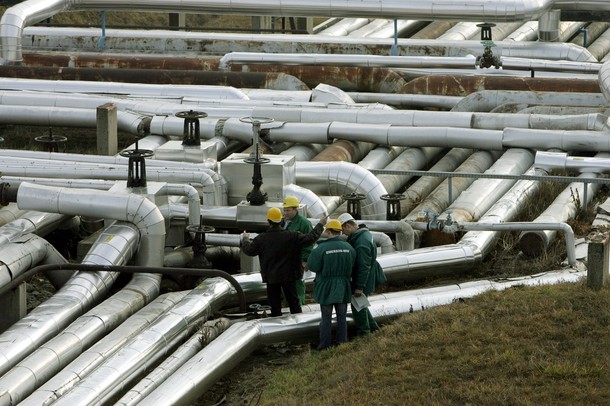
Russian Government Backing Surgut’s Move Against Hungarian MOL
Publication: Eurasia Daily Monitor Volume: 6 Issue: 121
By:

The Russian government is now openly backing Surgut Neftegaz’s surreptitious acquisition of a large stake in the Hungarian MOL oil and gas company. The acquisition is legally contested in Hungary. The Russian government’s political intrusion nullifies Surgut’s thesis that the acquisition was a regular, free-market transaction and friendly move, ostensibly untainted by Russian state involvement.
Russian Deputy Prime Minister Igor Sechin, responsible for the energy sector, came out in support of Surgut’s move on June 19 during the annual general meeting of state oil company Rosneft’s shareholders. Sechin announced that the government would back Surgut in its negotiations with MOL to consummate the acquisition of 21.2 percent -the single largest stake- in the Hungarian company. He claimed that Surgut and MOL are holding talks about long-term deliveries of Russian crude oil by Surgut through the Druzhba pipeline to MOL’s refineries.
Sechin also asserted that Surgut would face no competition from other Russian oil suppliers to MOL. He was thereby alluding to Lukoil, which delivers the lion’s share of Russian oil to Central Europe through the Druzhba pipeline, whereas Surgut delivers none to MOL’s refineries in the region. Sechin’s insinuation may reflect some intentions to divide the business between Lukoil and Surgut in Central Europe; or even to ease out Lukoil, in the eventuality that the Hungarian MOL -with its strategic assets throughout Central Europe- comes under Surgut’s control.
Sechin, who is also the chairman of Rosneft, was speaking in the presence of Surgut CEO Vladimir Bogdanov at the Rosneft shareholders’ meeting and the accompanying press conference. At this meeting Bogdanov joined Rosneft’s board of directors, in an apparent first step toward a long-anticipated tie-up between Rosneft and Surgut (Interfax, RIA Novosti, June 19; Vedomosti, June 22).
Meanwhile, the future of the Druzhba pipeline seems increasingly uncertain. The Russian government intends to shift part of the oil volumes from Druzhba into the Baltic Pipeline System, the first stage of which is already operational. This month, Transneft began construction of the second stage. A large share of the Russian oil export is to be routed from Siberia to Russian Baltic ports and onward by tankers to northern European ports (Interfax, June 10, 19). This route is planned to absorb a part of the volumes that are currently being delivered from Siberia through the overland pipeline system Druzhba to Central Europe. Possibly, Russian oil producing companies play this trump card against some consumers of their product.
Despite Sechin’s reference to Surgut-MOL "negotiations," no such negotiations are possible under Hungarian or European law with a company that fails short of basic transparency requirements, beginning with disclosure of its ownership structure. According to MOL’s communications director Szabolcs Ferencz, "there have been no negotiations whatsoever" between MOL and Surgut (Nepszabadsag, June 22).
Earlier this month Surgut initiated legal proceedings against MOL in Hungary to extract approval of its acquisition. Surgut has also announced intentions to build further on that stake and bring MOL’s choice assets into some kind of vertically integrated arrangement under Surgut.
The Russian company acquired that stake in MOL on March 29-30 from the Austrian OMV, barely a week after OMV’s CEO Wolfgang Ruttenstorfer had publicly denied any intention to sell that stake to any buyer during the current year. Surgut stunned the financial markets by paying double the market price of those shares as well as blindsiding the object, MOL, of Surgut’s self-described friendly move. The haste was designed to force Surgut’s entry into MOL’s April 23 annual general meeting of shareholders, exercise voting rights there, and take up seats on MOL’s board of directors. Hungary’s Energy Office (national regulatory agency), however, halted that move by declining to register Surgut’s acquisition of that stake. The Russian company had failed to answer some of the regulators’ requests for legally required information about foreign companies wishing to acquire assets in Hungary.
On or shortly before June 4, Surgut sued MOL in the Budapest Metropolitan Court of Registration, asking the court to rule that MOL must register Surgut as a shareholder. Moreover, Surgut is asking the court to invalidate MOL’s April 23 annual general meeting’s resolutions. MOL, however, cannot legally register Surgut as a shareholder unless and until the Energy Office regulators approve the acquisition, which it cannot do in the absence of legally mandatory information from Surgut about this company (MTI, Bloomberg, June 4, 5, 12, 13).
Surgut’s move is designed to bypass the national regulatory agency, attempting instead to pressure MOL directly. The latest shareholders’ decisions, which Surgut now wants invalidated, have added to MOL’s corporate defenses against hostile takeover moves by non-transparent foreign entities. Under these decisions, Surgut would be required to disclose its ownership structure and the identity of its ultimate beneficiary owners. Surgut, however, is being secretive on those and other issues. This has generated widespread suppositions on financial markets that Russian government figures control Surgut directly or indirectly through offshore middlemen.
Surgut’s attempt to force its way into Hungary -and farther afield into Central Europe through MOL’s assets in the region- amounts to exporting Russia’s characteristic business methods into European Union territory. The Russian government’s support for the move, as just announced by Sechin, reflects Moscow’s strategy to expand into Europe’s oil-processing and distribution sector, in parallel with expansion into the downstream natural gas sector.




